Items
Creator is exactly
self
-
2024-07-23
Ashley's Pandemic Adventures
During the pandemic I learned that I am not the type of person to sit still especially after being laid off from work. I did things from kayaking for the first time in my life (not pictured), to renovating my house, building a garden and buying ducks and taking care of them. I also was still in school (online), so I did my homework when I wasn't doing anything else. Despite the pandemic stopping the world, I didn't let it stop me from doing things that were important. During the kayak trip, I came face-to-face with a water moccasin that I never saw (not even after I got out of the brush), then later down found out I paddled over a gator that I never noticed was in the water. I did see the one snake that I paddled under though and was terrified it was going to fall into my kayak *shudder*. Renovating my house was both cathartic and rejuvenating because it felt like I gave the house a new lease on life. We bought ducks out of fear that groceries would be harder to come by (we were going to eat the eggs don't worry). Unfortunately, a pack of coyotes got to them a few months later which was a bit traumatizing. This was about a week before I blew my tire on my way to work. These were signs that I should have quit the job I managed to get, but I never listened. My dog and cats helped me with my homework during all of this because study time is important to keep the brain active. I painted actual paintings, fixed one of them that needed to be updated. I planted a garden, and somehow grew a pumpkin patch that sadly never grew pumpkins. Later, towards the end of the year I saw a full rainbow, and the end of one landed in my backyard. I felt that this was a sign that things would be alright even if it seemed like it wouldn't be. No, I never went to the end of the rainbow because you should never trust leprechauns. I will say...the one thing I never got used to was wearing masks. I get claustrophobic if I can't feel like I have air...and the masks were quite suffocating. I still wore them, but definitely never like them. -
2024-07-23
Why don't I remember most of Covid?
I remember working remotely from my kitchen for my job. I remember watching movies. I remember being locked down and taking trips to the supermarket wearing masks. I remember avoiding touching things and copious amounts of hand sanitizer. I remember my parents getting older and using facetime to be able to see them. I remember them dying and not being able to take a flight across the country to be there. I remember that birthdays happened without parties. I remember having Covid after being vaccinated, being careful and giving up so much of life. I remember finding out that friends had passed away and not knowing they passed. I remember starting to make changes in the way I do things like open a door without touching the handle. I remember being concerned for the safety of others and wearing a mask for their protection. I remember being chastised for wearing a mask and people trying to shame me for it. I remember holding my breath when a person passed me on the street to reduce risk. I remember standing farther away from people in line and not talking to people. I remember not seeing a smile and not remembering to smile. I smile now. It takes effort but I smile now. -
2020-03-24
From The Traditional to the Unknown: Moving from In-Person to Online Learning
Much like other college students in the spring of 2020, I did not know how to react to the news that a virus called COVID-19 had begun infecting major cities, towns, and people. As an avid gamer, it appeared to me as though we started heading down the path of a zombie apocalypse or something similar to that, such as the ones you see in Call of Duty. I can still remember where I was as a sophomore in college when my school decided that it needed to shut down, sending students back to their homes and moving classes to the online world. At the start of what became pandemonium, I was with my friends in one of their dorm rooms, and we watched as the former president of the school, with a panel of other officials, answered questions about the pandemic and how the institution would respond. From my perspective, it seemed that no one knew what to do, and it was disconcerting to see that the leaders of the school were themselves in a state of flux. But who could blame them? In many ways, that spring of 2020 was unchartered waters, where everyone, including our leaders, did not know what to do or how to set forth a concrete plan. The lack of certainty, as I recall, led many students to become unsure of how the school would handle classes, graduation, plans for reimbursement for housing and dining costs, and, most importantly, the health and safety of the students and faculty. From that moment in spring 2020, it seemed that the college landscape would never be the same. With that said, this leads me to the point of my story. When the school decided that all classes would go online for the remainder of the spring 2020 semester and the entirety of the following school year, 2020 - 2021, it seemed entirely new and, in some ways, scary. Never before had I taken online classes, let alone know how to operate a program called Zoom. When I read the newsletter from my school saying that the 2020-2021 academic year would be online, it seemed, from my view, almost pointless to make students do schoolwork at a time when everyone was more concerned about their health and not getting other people sick. From that perspective, I felt angry, confused, and dismayed about how online classes would work. More importantly, I wanted to know how professors would respond to the situation, hopefully having them recognize that they should not assign a traditional amount of school work for a semester course given the extenuating circumstances beyond the classroom and college. I can still recall taking my first online class, and I felt utterly lost. I did not know how to operate Zoom, I did not know how to interact with my professors and classmates by staring into a camera on my computer, and I did not know, at the start, how challenging it would be to feel motivated to do the schoolwork. The latter was a difficult obstacle to overcome as being back at home and not in a classroom made it easier to forgo doing school work for a day, creating a lackadaisical mindset that negated my ability to do my assignments in a timely manner. On top of that, not being able to physically see my professors, either in class or in their office, made it even more difficult to ask questions. As someone who typically raises an abundance of questions, it seemed to me that that was no longer possible. Having to send several emails back and forth and then only have a few minutes to speak with a professor on Zoom after or before class made the process more cumbersome. The transition from the traditional classroom setting to the unknown world of online learning was a significant curve ball created by the pandemic that made the last part of my sophomore year and my entire junior year feel less important. The online medium essentially made the coursework seem less valuable to me. Even though I lived on campus in my junior year, 2021 - 2022, at the height of the pandemic, the educational side of my college experience became impacted to such a degree that I found myself not as engaged about the work or the course material. To that end, I share this story because it is one of many about how the pandemic took a substantial bite out of educational processes from 2020 into 2021. The classroom never felt the same during the pandemic and when I was on campus in 2021. Everywhere was a ghost town. In many ways, having to go from the traditional classroom into the expansive world of online learning was not something I thought I needed to think about as a college student. Of course, no one could have predicted what was going to happen, making the situation during that time all the more difficult to accept. I look back on it now and realize that I did lose a year and a half of my college experience. It is an unfortunate outcome of the pandemic, but I am thankful that no one in my family passed away from the disease, and all of my friends were safe as well. I wish I could relive my sophomore and junior years as a regular college student. However, having gone to college in the midst of the pandemic is historic, and I want to tell other generations about this experience. It will be challenging for future students to know what it was like to go to school at the same time a rampant disease spread across the globe. On the flip side, I think going to college during this time shows resiliency and courage on the part of many people. I hope this story is one that many can relate to as we move forward from these troubling years and continue to grapple with the legacy caused by the pandemic. -
2021-06-13
Infectious Intimacy
When the pandemic started, I was living in a studio apartment in North Austin. I was single, my friends were quarantining, and I was going stir crazy. I got on Grindr to look for someone to spend some time with. I just wanted some human contact. I ended up talking to a cute boy and we decided to meet up, because we were both social distancing and had been recently tested. Funny enough, he worked at a morgue. He offered to pick me up, and when he arrived, I was SHOCKED to see that he had driven his hearse to get me. It was a great reminder about how close death was for all of us in the COVID-19 pandemic. -
 2024-05-20
2024-05-20Walk With Me Surving Covid
This book takes you on Tracys journey as a COVID survivor through a traumatic experience. She is faced with losing her independence, having to rely on others, and letting go of a love she thought she wanted only to find the real love she needed. Tracy shares how she copes with depression and PTSD and lives and functions with it daily. This book is a powerful testimonial from a truly strong woman who shares how her faith was her strength -
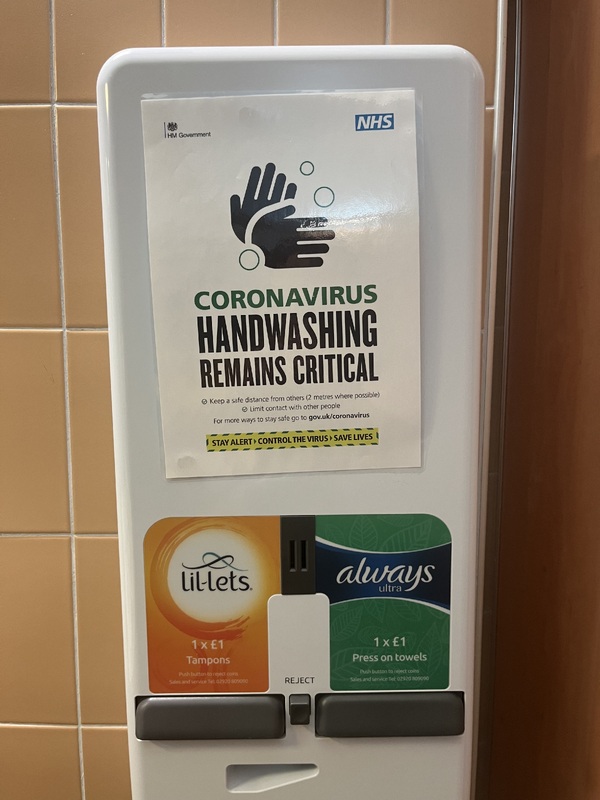 2024-06-18
2024-06-18Handwashing @ the National Records of Scotland
It is summer 2024, I am visiting Edinburgh, Scotland for a study abroad class with ASU online MA history students. Today, I am working at the National Records of Scotland. As I visited the loo before I headed upstairs to research, I noticed this sign reminding staff and the public to continue washing their hands to reduce the spread of COVID-19. I hope that none of our students/staff get COVID while here and that it is a mild strain if they do. It feels like a phantom on the past, but one that could certainly reappear unexpectedly. -
2020-04-10
Connections
My personal experience with Covid-19 is that for me it has shaped the way I see relationships and it has also affected me personally with my grandparents death. I think that quarantining is important but as a teenager it has made it more difficult to socialize and has made me more awkward and opposed to talking to others. My familial relations have also been affected as my grandparents lived in Europe and I was not able to see them a last time before they passed and was not able to attended their funeral. It is hard to come to terms sometimes and is a difficult fact to accept. I think that Covid has reshaped the way I see relationships and human connection and is something that I actively am trying to improve. -
 2024-05-10
2024-05-10Two weeks turns into months
Hearing of this so-called COVID-19 virus towards the beginning of my junior year of High School sounded a little suspicious. It was as if I was watching a movie about an apocalypse. Where everyone rushes to the supermarkets and grabs everything they can. Disinfecting every item as we bring it back into our house. Making sure we wear masks. The news of hearing that two weeks off of school to any student sounds amazing. Although I didn't expect it to turn into months. Not being able to see any of my friends or teachers. Learning everything online has changed the way schools teach to this day. It went from "Yes two weeks off" to "Where did time go?". As time passed going back into school was an adjustment as well. Only kids with the same starting last names had to go to school one day while the other half had to another day. Still, wearing masks doing COVID check-ups before entering the school as well as even checking our temperature as we walk in. Overall looking back I've noticed how hard Covid hit globally. People had to isolate for long periods of time, making sure family members and friends were okay. It was overall a tough time, but we can take a lot from this pandemic to use in future uses. -
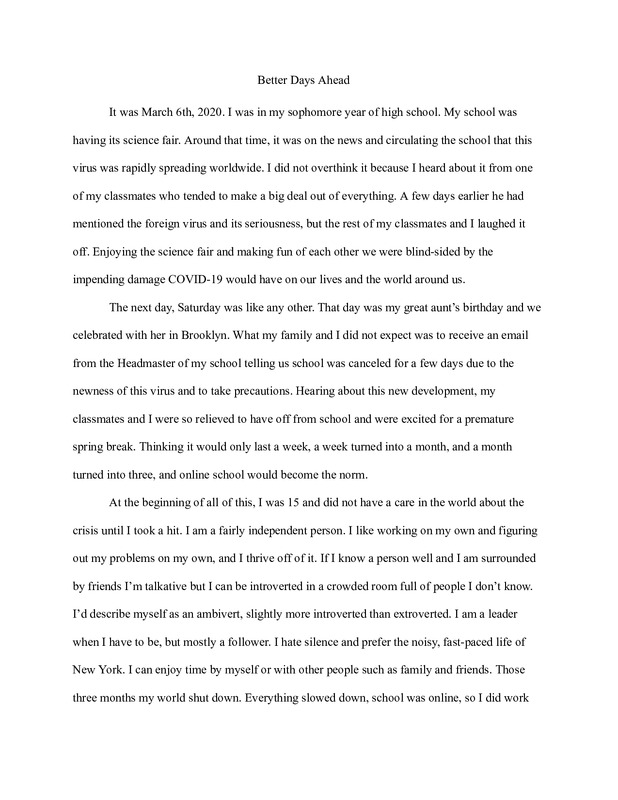 2024-05-10
2024-05-10Better Days Ahead
The story I submitted talks about the important lessons I learned from the pandemic, life lessons that I will continue to take with me through my life. -
2020-04-01
Navigating the Pandemic
Covid-19 was life changing not just for me but for the rest of the world. Finding out that school was going to closed for a day, to two weeks, to months and then suddenly spending my senior year of highschool through zoom. At first, like every student I was excited that school was going to be off for a few days but who would have known what we were in store for. During this time, I was taking all classes through zoom, just like every other student, and the only thing that mentally got me through this pandemic was my PGC family. PGC is known as Peer Group Connection in my high school, Thomas A. Edison CTE. This class was operated by the seniors who had this own group with another partner to talk to freshman, sophomore, and juniors. This class was mainly about encouraging and helping one another as well as doing activities. Although, the pandemic had a significant impact on this class, we were only meeting through zoom but overall we were all eachother's support system. We talked about any and everything with our kids, the good and the bad. This helped us tremendously with our emotions, as well as still having fun through such a difficult time period. -
2024-05-09
COVID 19 zero contact
The pandemic was the worst for me to be honest because I couldn't take a class that was designed for on campus. Because of that, I had to drop the class and wait for campus classes to be available so I could learn better in the classroom settings. I was depressed because it was my first time dropping a class since I started college in spring 2018. I had to wait for the next semester to retake the class which held me back a semester . I'm happy I got out of that stage which took me a while to get out of. I had to go to work regardless of what was happening in the pandemic because I was working in a retail store at the time and wasn't allowed to stay home like other people. Until you have COVID and you submit your doctor's note to get two weeks off. The new rules that were made for the retail stores cause people to fight because of a cough or a sneeze was just overall depressing. The news was very depressing because older people in the nursing home could see their loved ones before they die or hug them for the last time. Nurses couldn't go home to their family because they had to work long hours and they did not want to carry any disease home to their loved ones. 2020 was No bonding time at this moment. -
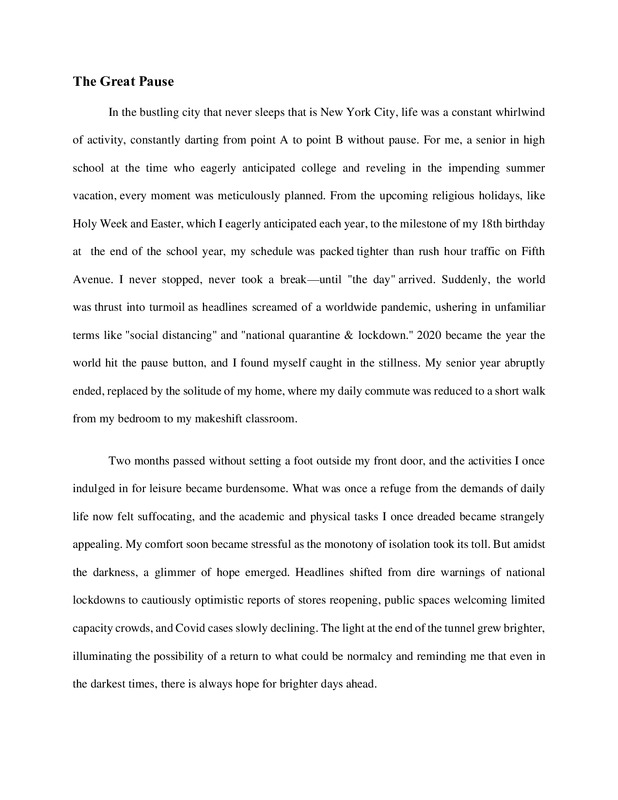 2024-05-07
2024-05-07The Great Pause
This story depicts my personal experience from the start of the pandemic up until the start of college. This narrative of this experience in my life was very important because the pandemic instilled a deeper appreciation for life's moments and a renewed sense of purpose, guiding the journey through college and beyond. -
2020-04
The Unseen Heroes: A Tribute to Essential Workers
In the turbulent maelstrom of the COVID-19 pandemic, a silent but terrifying force has emerged: the workforce needed They were the unsung heroes of our time, navigating the treacherous waters of the mind uncertainty and fear to keep the public afloat. When I think about the impact of COVID-19, I am drawn to their stories, their sacrifices and their resilience. Each day as I scoured the news, filled with alarming statistics and heartbreaking stories, I couldn’t help but marvel at the dedication of these individuals. And from the health care workers fighting on the front lines, to the store clerks making sure things stay on the shelves, to the delivery drivers braving the delivery of vital supplies to our doors and them courage and selflessness are beacons of hope in the darkest of times. I remember a particularly poignant moment when I saw a picture of a nurse in protective gear holding the hand of an elderly patient. The painting spoke volumes about compassion and human connection in the face of loneliness. And it captures the essence of the epidemic: struggle, solidarity and the unwavering spirit of humanity. But amidst the chaos, there were also moments of beauty and resilience. I stumbled upon a series of Instagram posts featuring acts of kindness - neighbors helping each other, community members rallying to support local businesses, and strangers offering words of encouragement through virtual forums. This gesture was small, but powerful in its impact and served as a reminder that humanity triumphs even in the darkest of times Sharing these stories and ideas reminds us of the importance of documenting our collective experiences during this period of history The pandemic dramatically changed our world, leaving an indelible mark on our collective consciousness . . . . By preserving this information, we ensure that future generations understand not only the challenges we faced but also the strength and compassion that emerged in response. -
2024-05-07
Life Before and After COVID-19
Before COVID-19, no one thought twice about social interactions. After COVD-19 that's all people were thinking about. Something that was so normal and mindless became the one thing that people were afraid of. After lockdown was over, many people had social anxiety because they went form not seeing anyone to seeing everyone. People were so afraid of catching COVID-19 that they chose to be alone rather than live their life and make memories. Coming back to school after lockdown was so scary. I was so used to not having to see anyone or care about what anyone thinks because we had class from home. Seeing all these people, made me so self conscious of what people think and how to behave normally. It was almost as if I had never talked to people in my life. Even now in 2024, people don't interact in the same as before. It's more normal than ever to see people wearing masks. I feel that this is the new normal and we are probably never going back to how it was before COVID-19. -
2020-04-04
Covid Helped Me Grow
My story takes place at the beginning of the pandemic in 2020 (Quarantine). The two weeks off that my high school mentioned had passed. It was at that point that I knew it was going to be a lot longer than two weeks. I was always quite the introvert, so the first week or so was very manageable for me. However, I soon realized how much I underappreciated getting the chance to leave the house and go do things such as going to restaurants, running errands, and most importantly, spending quality time with friends. It was during this time period that I was at one of the lowest mental states of my life. To add on to that, I was in a relationship at the time of quarantine. Long story short, we had some complications with our relationship before the pandemic, and it only got worse during the early days of it. However, for a more positive note, I spent a lot of time with my family and also my friends via facetime. Aside from that, I had an incredible amount of time to myself while stuck in quarantine. I used this time to myself to reflect on myself and how to improve my life and to get it together. As some time passed and after a lot of journaling, I had made some decisions that was going to change my life and make me a better and stronger individual. To list off a few, I had decided to end my relationship with this girl because I had found that we truly were not compatible with each other. Another thing was to get my first job so I can make money, stay productive, and also meet new people. I also decided that i was gonna be more social and really try my best to put myself out of my comfort zone moving forward, once the quarantine had concluded. I can proudly say that while I'm not perfect by any means, I had made these changes in my life and I am now extremely content with myself. Overall, this story is important to me because while I was in one of the worst periods of my life, this was one of, if not, the biggest learning period of my entire life. The amount of lessons that I took from my experience and the adversity that I went through during the pandemic has shaped me up to becoming the best version of myself. I can confidently say that I am just getting started and will continue to constantly improve myself as time will go on. -
2020-06-12
A missed out senior year.
When it came to finally reaching my prime year, senior year in high school, I was nothing but excited for finally having that prom experience, the one I've seen in movies for years and the thing that I hyped up in my mind with my now EX ex-girlfriend. Except thanks to covid happening, all of that was shut down, completely shut off from happening. So instead of having prom, I had nothing. Which, to many people would have been seen as stupid but in high school I would've done anything to have something like that. An experience to dress up for a good cause and see people in dresses. Except since it didn't happen thanks to covid, I have a sort of missing feeling when it comes to high school. Everyone talks about prom and how amazing it was, and now I cant relate to it at all since I never experienced it. Probably the main reason why i ahte talking to people . -
2020-08-10
Saying Goodbye during the pandemic
During the pandemic my grandmother acquired the virus and desperately needed medical attention but the Healthcare system in a third world country such as Peru was saturated. she had to wait outside the hospital in a temporary medical tent. my grandmother passed away two weeks from her diagnosis. many other families experienced the same situation. this story is very important to me in order to spread awareness of what can happen if a country's health system is not equipped with the necessary tools to handle such terrible events like the pandemic. -
2020-12-20
Declaring Patient 100 Deceased Life as a NYC EMT During an Unprecedented Global Pandemic
December 20th, 2020, started as an “ordinary” day for myself and my colleagues. 1600 hours rolled around, and my partner and I clocked in for our sixteen-hour tour. We had finally adjusted to our new routine of working a mandatory sixteen hours as opposed to twelve. As emergency medical technicians, we were at the forefront of the COVID-19 Pandemic in New York City. Our region was hit hard by COVID-19 and seemed to be the epicenter of the pandemic for longer than one could ever imagine. For NYC EMS workers before the pandemic, it was common to see around three thousand calls for service daily across all five boroughs. Once the pandemic struck the call volume rapidly overwhelmed the city's EMS resources as they answered a record seven thousand calls for service daily. My partner and I made small talk as we awaited the arrival of the outgoing crew. The day shift arrived back at the station exhausted, defeated, and depressed. They informed us that during their sixteen-hour tour, they had answered twenty calls for service; fifteen of which were for critically ill patients. After some small talk, we exchanged medication kits and radios as it was our turn to serve the great city. Immediately after logging on to the computer system and giving the dispatch center an in-service signal, we were called for a priority one assignment. Our unit was called to the scene of a thirty-two-year-old mother diagnosed with COVID-19 who had stopped breathing. As we arrived at the scene, I donned my four-day-old n95 mask, as well as a makeshift gown made from a garbage bag with holes cut for my head and arms. As we made our way up the five flights of stairs the sound of the screams grew louder. We entered the apartment to find a woman lying on the couch who was clinically deceased. For the next forty-five minutes, my partner and I worked feverishly to perform cardiopulmonary resuscitation, defibrillation, endotracheal intubation, as well as intravenous cardiac drug administration. Despite our efforts, the patient continued to show no signs of life, my partner and I locked eyes and nodded at one another, knowing we had done all that we possibly could have for this patient. I switched the cardiac monitor off and looked down at my watch as I said, “Time of death 1705 hours”. Our next responsibility was to inform the patient’s husband and children of her passing. While you train for many hours to show empathy after death, this task never gets easier. My partner sat in the kitchen with the family, while I prepared the paperwork for a death pronouncement. My partner delivered the life-shattering news and did her best to console a grieving family. After returning to our ambulance to decontaminate our equipment and restock for the next assignment I opened my logbook to record the death encounter. My heart sank as I turned to the next open page which was page number one hundred. In less than one year, I had pronounced one hundred patients deceased from COVID-related illnesses. In my short career before the pandemic, I had only pronounced about fifteen patients deceased. It was at that moment that the true magnitude of the pandemic sank in. COVID-19 had decimated the way of New York City life, the previously bustling city remained shuttered as many remained in indoors in hopes of preventing illness. Before the pandemic, I had known the city as a connection of vibrant neighborhoods filled with culture and joy. COVID-19 had robbed our great city of its life and color; for the next two years, the city appeared black and white as a shell of its previous greatness. These thoughts quickly fled my mind as my unit was once again called to another high-priority assignment. We were called to a sixteen-year-old man diagnosed with asthma, who had recently contracted COVID-19 and was struggling to breathe. Our days were filled with assignments like these, often with no rest, and zero opportunities for a meal break. Nearly one year into the COVID-19 pandemic, my colleagues and I were exhausted, and our mental health and morale were at an all-time low. Many of my collogues fell ill, and four of them died because of COVID-19. We had often asked ourselves and one another; “Why Us? Why are we still doing this job? and when will this end?” While these times were challenging, we understood that we had been called to work in EMS because of our passion for caring for those in need. Day in and day out, we found strength and resilience in one another. My colleagues and I had implemented daily peer support groups in which all were welcome to come and speak about their experiences. While COVID-19 seemed to pull the world apart, it pulled EMS staff closer together. Enemies quickly became friends, and seemingly overnight we all became family. Our perspectives were unique as we were the only healthcare providers to enter the homes of the ill, and feverishly worked to care for them under less-than-ideal conditions. As the number of COVID-19 cases began to decline with the introduction of the vaccine, my colleagues and I felt we could breathe a sigh of relief. As quickly as the pandemic entered our great city, it seemed to vanish even faster. Each shift brought hope as we watched businesses reopen, and the streets were once again filled with color and culture. While we experienced new variants and spikes in COVID-19 cases, we felt that our great city had become stronger and more resilient. While COVID has changed our way of life, one thing I will never forget is the comradery we built amongst the emergency medical services personnel. To this day my colleagues remain a second family in which I can confide after a difficult shift. While COVID was one of the greatest challenges faced by New York City, I feel that it has made us stronger and more resilient than ever. -
2021-04-19
Brave
Covid 19 almost took away one of the most significant people in my life, my grandmother. The near loss of my grandmother due to COVID-19 made me realize the devastating impact infectious diseases can have on individuals and their families. It reinforced the importance of proactive measures to prevent disease spread and protect vulnerable populations, regardless of ethnicity or background. This experience made me strong enough and brave enough to provide my grandmother with the support and comfort needed during this scariest moment of my life. During my grandmother's battle with COVID-19, I learned firsthand how crucial it is to provide unwavering support and comfort to loved ones during challenging times. The emotional strength and presence I offered her made a significant difference in her recovery journey, reminding me of the power of love and compassion in the face of adversity. -
2024-04-18
The Dream
The Dream that kept me going despite repeated severe Sickness, All I want to say is that the longer the darkness, the longer will be the light. -
2020-03-31
Covid: My Experience in the Pandemic
Covid: My Experience in the Pandemic The pandemic was an unforgettable experience for my family, as well as countless others. During a time of struggle, we faced many unforeseen challenges that were somewhat difficult for our developing minds to comprehend. Not to mention, the greater the understanding, the greater our issue seemed to be. However, in a time of dread, it became a blessing eventually. In the beginning, it was more of an adjusting period. The idea of quarantine rocked our worlds as we could no longer be out and about. Attempting to find creative solutions seemed challenging, which led us to free meals from different businesses attempting to be of service. Not to mention, on Sundays, we were unable to go to church. However, this soon became a blessing as we began doing “church at home”, which quickly led to a strong family bond. Around the middle of covid, things became slightly easier. We were beginning to adapt to the challenges presented to us. We began working with our neighbors’ family to complete online school, which formed an unbreakable bond with them as well. The grandmother of the house made everything go smoothly, and she supported us over the years. Moreover, in previous years, she would work with my siblings and I to ensure our success in academics. Finally, the end of covid felt like the worst. The transition back to school was not without its tribulations. Others like me had lost their sense of self, acting irrationally. In the midst of it all, the grandmother of our neighbor's family caught covid. Unfortunately, she didn't make it. It took a long time, but we came to terms with it and we were truly blessed to have met her and blessed because she was a chapter in our lives. In conclusion, my family as well as my neighbors’ felt the challenges of covid. However, instead of separating us, covid (ironically) brought us closer together than ever before. From bad to blessed, from terrible to terrific, a great tragedy ended up being a valuable experience. In the end, I'm thankful for covid shaping my character and strengthening my loved ones. -
2024-04-09
My Horrible experience
Whenever COVID first started I didn't think about I thought it was nothing I remember when we got two weeks off of school I was excited about it then they told us we wouldn't be going back and we had to do work online with no teacher help it was a horrible experience I passed but my grades weren't that great and I got really lazy and started to gain a lot of weight didn't go outside for a while and I couldn't play football than when 9th grade started it was a weird experience going online and then going to school for two or three days out the week and have to stay 6 feet from everyone it was a hard experience I played football but it was 4 or 5 games, not a full season and we had to wear a mask it was bad. COVID took a lot from me during my freshman year of high school and other things that were important to me. -
2020-08-18
life in camera
When COVID-19 first started I was in 8th grade. I didn't really understand what Covid really was or how serious it was. I went in feeling kind of okay about it all and staying at home. Once high school started things went downhill for me mentally. I did pretty well in school. I did all my work and turned it in on time and got good grades, but I struggled a lot mentally with myself and socializing with others. During that time being at home did help me to get closer to my mom, we would go walking throughout the day and that helped me a lot to start losing weight a lot more. However, I started to become depressed and struggled with my outward appearance a lot. Once we started going back to school in person, I didnt know ow how to act, I just felt ugly and quiet. I used to be such an outgoing person and I would talk to almost everyone. Now I don't like being in public and around others. I have very bad social anxiety and overthink a lot about what people think of me. I personally never got Covid-19 so I don't know how that can affect someone physically and I hope I never do. I watched those around me get it and the way that they struggled and even saw a few of them die. It was a really depressing time, to watch your loved ones around you hurt and struggle and eventually give up, and you're never able to see them again. Going back to school in person did help me a lot. Socializing with people and seeing my friends that I hadn't seen in so long was what really helped me to get out of my shell and help me love myself more. -
2020-03-14
Leah's experience with Covid
The objective of this story is my personal experience with Covid 19 and the shutting down of the world around us due to the health affects. At the beginning of the Covid 19 in 2020 where all schools were beginning to mandate the wearing of surgical masks to stop the spreading of the newly found disease, Personally I didn't expect this disease would shut down what we once knew as normal. In the early days of the pandemic my family was the ones who were reluctant to wear the masks, as we did not realize the danger that is to come. Only a few weeks had gone by and the schools and stores were beginning to shut down and everyone had begun to learn the severity of this pandemic. Doctors were turning away patients who were suffering with health issues caused by outside sources other than the pandemic, causing other lives to decline. As a middle school student watching the depletion of the world right before my eyes, I was afraid of what may come in the following years. I was afraid of the pandemic and what negative affects that it may bring to me and my older family members. I was also afraid of the new norm that I now had to get used to along with the remote learning and not being to hangout with my friends and family as I once did. -
2024-03-14
A lifelong Dream Journey to Egypt
At the height of the pandemic, I was in Arizona working in the Maricopa County Supreme Court system. In transparency, there were not very many restrictions, let alone travel restrictions. Additionally, several times I was able to leave the state and go visit my family in my hometown of California which had several different restrictions such as a complete shutdown as well as social distancing and wearing a face mask. Once travel restrictions were lifted, I did not take any specific big trips, due to my living/daily life experiences not being drastically changed living in Arizona during the pandemic. I was still going into the office everyday, in court everyday, and able to do many of the same activities that I would do on a daily basis. As an additional note, if I could travel anywhere in the world, I would love to visit Egypt, specifically Cairo. For as long as I can remember I have had a great fascination with ancient Egyptian history. During my free time, I love watching documentaries about the discovery of ancient Egyptian artifacts and what they symbolize. Being able to actually see Egyptian artifacts personally, would allow me to gain a deeper understanding of ancient life in Egypt. On this trip, I would also like to see the Giza pyramid complex. Pyramid construction and symbolism is another great interest of mine. Recently I have started watching a documentary called, Lost Tombs of the Pyramids, and it exploration and excavation of pyramids. Overall, on this trip, I would document this trip using photography and videography. Those are what I normally use to document trips taken. I like this method because I am able to go back and physically look at sites in my camera roll if I ever wanted to. I have never been outside of the United States, and I hope to accomplish the goal of traveling out of the country soon! -
0012-03-20
The Day the World Changed
On March 12th, 2020, I found out the fate of the remainder of my first spring semester as a college student. I don’t remember much about days during quarantine, but I do remember specific details of this day. It was the week before Spring Break for UAB, and all students were preparing for a week off from school. That weekend, my family was planning a trip to New Orleans for the weekend as my mother’s employer offered her a free two-night stay at any hotel of her choosing. My dad and I were planning to finally visit the National World War Two Museum. As my friend and I were walking to dinner at a local poke place in Five Points South, I received my first email that my English class would remain virtual for the remainder of the semester. My professor had Type 1 Diabetes and did not want to risk his health. Shortly after, the entire student body of UAB received an email that students would not return to campus until April 1st, 2020, at the earliest. While some students decided to pack up all of their belongings and take them home with them, others truly believed we would be coming back on April 1st. I decided not to take my belongings with me and traveled four hours to my hometown for the extended break. I went home that Friday, March 13th, 2020, after taking my midterm for Biological Anthropology. Once I arrived home, my parents made the decision to cancel our trip as the spread of COVID-19 was unknown at this time, and they did not want to risk going to a public and crowded place like New Orleans. Instead, my father and I traveled four hours back to Birmingham to pack up my dorm room and bring my belongings home. At this time UAB had completely shut down and was limiting access to campus and the dorms. They only allowed me 15 minutes to get any belongings needed. After that trip, UAB officially closed for the remainder of the term and students belongings were moved out of the dorms by moving companies to make room for healthcare workers. We did not get the chance to go on our New Orleans trip until over two years later, in 2022. I planned a big trip for my 21st birthday with my friends and family. While most restrictions have been lifted, people were still wearing masks, and businesses were still enforcing the three- to six-foot social distancing. I wasn’t surprised, as just earlier in the year, my employer required face masks for the spike in COVID cases in Birmingham. I remember going to restaurants and we were required to wait outside for our table. In the National World War Two museum, there were stickers on the floor that represented how far we should stand from each other. While many of the restrictions, including the social distancing and wearing a mask, had been lifted, it was nice to see that people were still making it a point to follow them for the safety of themselves and others. -
2023-05-19
Griffith Observatory
The Griffith Observatory is located in Los Angeles, California, where COVID-19 restrictions were lifted in February 2023 statewide. This picture was taken in May of 2023, just a few months after the Observatory stopped asking for proof of vaccination before letting you in and lifted its face mask mandate. I had been to the Observatory several times before the pandemic, but I stopped once the pandemic hit. Although the Observatory was open during the pandemic, it required visitors to wear face masks and show proof of vaccination before allowing them to enter the facility. -
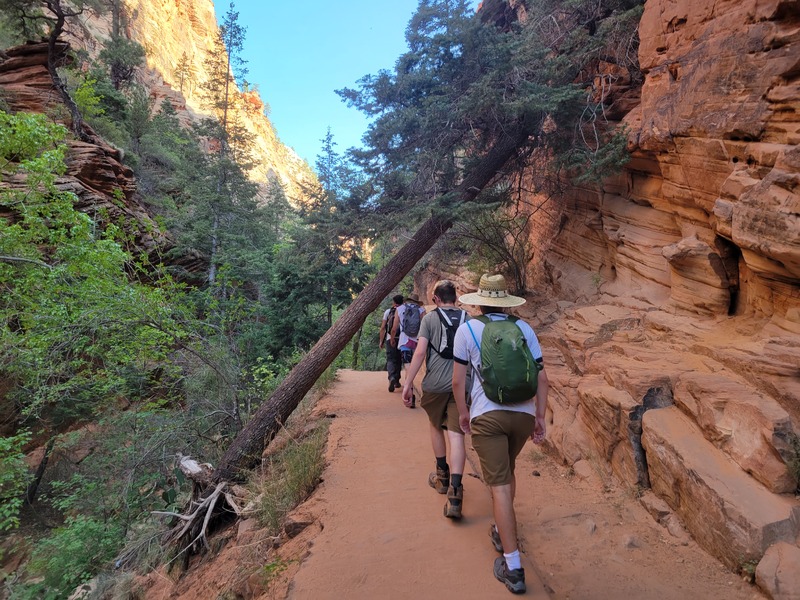 2021-07-23
2021-07-23The Trail to Angel's Landing
There are few ways to describe the events of 2020 other than chaotic. The vast, sweeping changes that occurred left many confused and grasping, often in desperation. Meanwhile, 2021 was a mixed follow-up for a year where much remained the same, but travel restrictions began to lift. Seeing this window of opportunity, four friends and I leaped at it. We planned a weeklong trip to Zion National Park and on the first day, we headed for Angel's Landing. The situation around the pandemic resulted in a kind of claustrophobia that superimposed a hyperawareness of personal space. For many, where six feet distance apart was not just a courtesy in some establishments, but a rule that was often enforced. This condition of anxiety or even fear of contracting COVID-19 from another person in the limited size of restaurants, cafes, and grocery stores was easily felt. This kind of spatial awareness bled into one's perception so deeply that it might be retroactive. While watching a pre-pandemic movie with a shot of a crowd, the thoughts would intrude, "Where are everyone's masks?" or "Why is everyone standing so close together." Southern Utah is a great expanse of mesas, mountains, and bluffs under a rolling sky. Zion reflects this in the great size of the rock formations and the verdant greenery accompanying it. The contrast in scale highlights the simple fact that getting up to the tallest point of Angel's Landing is an exercise of walking upwards at steep inclines, often with other people in front of you, creating a line. Maybe it was the change in setting, but for a while, it was as if the pandemic was left behind. Everyone still brought masks, wore masks in crowded environments, and used hand sanitizer but the anxiety was not there. It appeared to be the common rule that the other tourists had agreed to. Replacing the fear was a determination to get to the highest point of the trails and photograph the scope of it all. It was only the first day of the trip and I had already been astounded. -
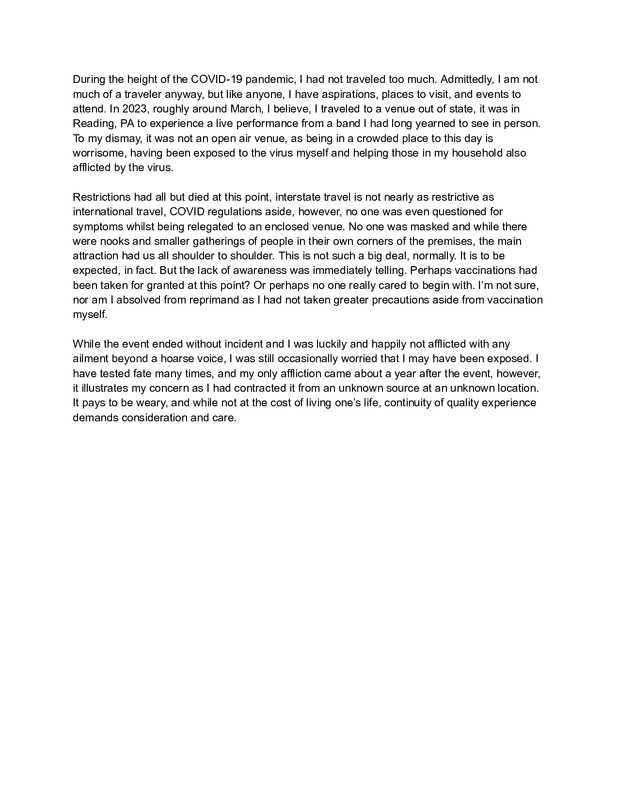 2024-03-14
2024-03-14Reflection on the Attitudes About COVID-19: A Concert Venue
The photograph is not so much exemplary of my thoughts as much as the story. Even then, it was very late and much of the "heat" surrounding COVID had since died down. Regardless, it serves as a reflection of my thoughts concerning the attitudes regarding COVID-19 and its treatment when attending certain events. It is among the few travel experiences I have, however, it is an important time to me. The story explains the general unconscious aversion to COVID consideration, at least, as I understand it upon reflection. -
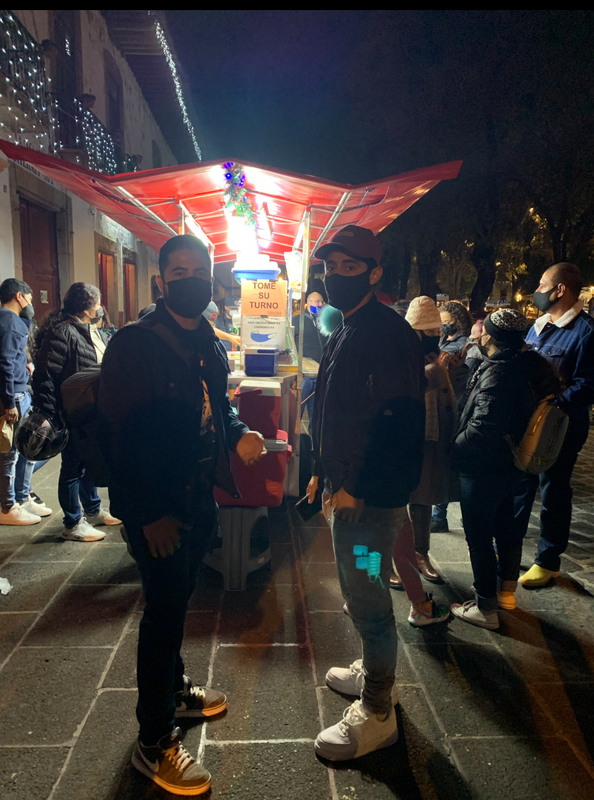 2020-12-26
2020-12-26Everyday life amidst a global pandemic
When the covid restriction lifted my husband and I decided to visit family in Mexico. Because of the ban we were not able to attend funerals, birthday parties or any type of celebration. Despite the pandemic and the restrictions life seemed to be about the same 8 months after the pandemic had first been announced with some small changes. In a street corner waiting to order food, everyone was wearing masks. The elderly, children and the vendors themselves which was surprising considering the push back there happened to be originally from the Latin communities. The solidarity in the mask enforcement had now came from fear. The people in the streets were scared but had to continue their jobs as vendors and others having to go out side and purchase from these same vendors despite the fear of getting sick. When I think back to the first year of the pandemic I think about small moments like these, something as simple as purchasing street food now came with a worry of possibly getting yourself or others sick. -
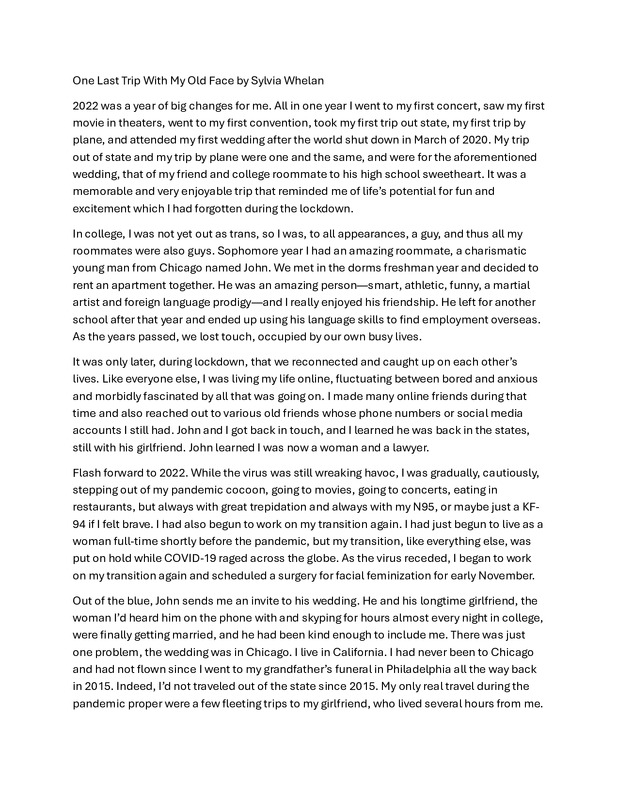 2022-10-16
2022-10-16One Last Trip With My Old Face
This is a story about my first trip out of state after the pandemic began. During lockdown, I reconnected with an old friend and was later invited to his wedding. It was my first time going to Chicago and I had a wonderful time. -
2024-03-14
Multiple Covid Trips
When travel restrictions were lifted, did you take a trip? If so, where did you go and why? What are your memories of this trip? Were there any continuing COVID-19 restrictions in place? I swear I have no strong political opinions, but I looked at the stats for 30-something men for COVID, and decided I'd just go for it and refused to ever hide (except for that time I got Covid in July 2020). I went on SEVERAL trips. Also, I was a teacher in a VERY conservative area (read: students and parents were aggressively anti-Covid measures) and my wife was a nurse. I figured I was bound to get Covid and ruled a personal judgment of "Who cares? Especially if it's inevitable as this stuff spreads like glitter ..." I was a teacher and then delivered Ubereats nonstop as a form of "time travel". But we took the following Covid trips: May 2020 to Houston/Galveston. June 2020 to Colorado (Between these trips, I decided to focus on working and saving to buy a house as everything was shut down worldwide, there were no more trips to make) June 2021 to Port Aransas, Texas August 2021 to Colorado again (wife is from Colorado, thus the repeats) March 2022 to Northern Finland (Lapland) and was able to spend about an hour in Sweden, since we rented a car. August 2022 - Went to Costa Rica for the wife's 30th birthday. (Covid restrictions were gone by this trip). May 2020 to Houston/Galveston was a bit strange. I got asked to pick up a painting for my parents at her friends' house and so we turned it into a birthday trip for me. Hotels and beach were curiously packed and Texans simply did not care about COVID at this point. June 2020 to Colorado - George Floyd riots/protests (your decision) shut down downtown Denver and put us in a curfew where we couldn't leave the house after 8:00PM, so that was interesting. Still enjoyed the mountains and the fresh air, but we couldn't do much in Denver. The interesting thing at this point was the "two weeks to flatten the curve" was being revealed to be wrong, so we didn't know what to think anymore after this. August 2021 to Colorado - I have little in the way of memories of this trip. Wife really wanted to go. We saw more mountains and more of her friends. We ran away from a giant black creature in the woods (BEAR!) that was revealed to be a black cow and my wife makes fun of me for this to this day. More scared of that "bear" than I ever was of Covid. March 2022 to Finland - This was interesting. Finland was completely open and the primary restrictions were the US Government requiring masks on planes. We had to get a booster in order to go, which annoyed me, but I did it. The service in the airport was fascinatingly horrible and we were delayed by about 36 hours to Finland, which means we just missed the last Aurora of the winter. They also lost and then broke my wife's luggage. We drove around Northern Finland and even popped into Sweden for an hour because "Why not?". Other funny thing was everyone was very scared for us, because Russia had just invaded Ukraine and I had to reassure everyone that after the Winter War and World War II, Russians decided Finland was haunted and to never return (for historical accuracy, this is a joke, but it was a fun joke). I liked Finland/Lapland, but it was more expensive then Tokyo. I've never been anywhere more expensive in my life. Gas was somewhere in the range of $11/gallon, due to the invasion (on top of already high European prices). We met Santa, I got bit by a reindeer and sled dogs are a rambunctious bunch of creatures. We slept in the ice hotel you see sometimes in travel blogs. The stores were all open. Everything was open. Finland simply did not seem to care about Covid and my understanding was Sweden didn't either (part of the reason we shrugged and popped over). I had literally one person one time ask me to put on a mask when I went into a store, but this annoyed us and we left. August 2022 to Costa Rica - Flew in and out of Liberia, Costa Rica (not San Jose) for reasons I don't remember - I think I did that because I was desperately trying to make it an open-Jawed trip (fly in to Liberia and fly out of Panama City). I remember being annoyed because I told my wife repeatedly that "I don't think Costa Rica will be as cheap as everyone has told you" and it wasn't. It's pretty and nice. It's not really cheap at all. Interesting thing here is there were absolutely ZERO Covid restrictions. Nothing. None. Not one. Over. The story was over. So I'll end it there. -
2021-06-14
Family Trip to Florida 2021
My father is a world class powerlifter who has podium placed at world championships before. He was planning to do the qualifier for the next world championship in 2020, but that was understandably delayed. When stay at home orders were lifted, he competed in the state level qualification event, in his case North Carolina, for the national championship. He had to lift in a mask, which was uncomfortable and potentially dangerous as lifters could not always get enough oxygen during and after a lift causing some to pass out and need medical attention. He did well enough in the qualifier to proceed to the national championship in Daytona Beach, Florida. On that trip, COVID restrictions were very few, if any, with the hotel, lifting event, and restaurants/stores not having mask mandates or vaccination checkpoints. Unfortunately, my dad did not win this championship. He did, however, come back the next year and won the 2022 championship in Orlando, Florida. When we went on that trip, COVID precautions were not really present at all, and it almost seemed life it was before COVID. -
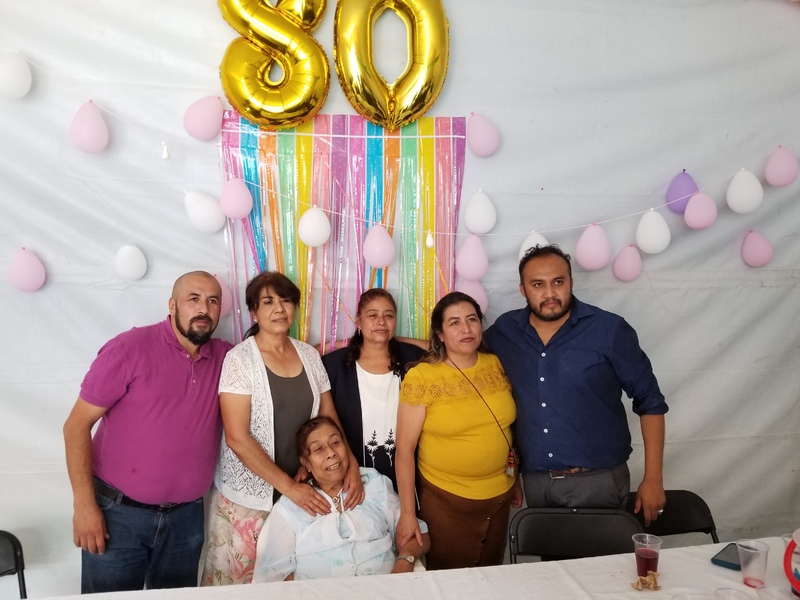 2021-07-30
2021-07-30Covid Was Over
In 2021 my Mom and I planned a trip to Mexico to visit her side of the Family. We had been putting off the trip because of a lack of money and then Covid hit. It had been seven years since my mom had been able to visit her mother and her siblings. At this point in time, travel restrictions and quarantines were largely a thing of the past. People in my area no longer considered Covid to be a threat in the way it was viewed in the early part of 2020. Masks weren’t in common use and people went about as they pleased. Deaths were still rising. By June of 2021 our trip took place. Most of the big travel restrictions had been lifted, but oddly enough America still had testing restrictions for reentry. Mexico, a nation that still cared about limiting the spread of the virus, had no testing or vaccination requirements for entry. We went on our trip and had a great time visiting our family in Mexico City. While staying we decided to visit the Museum of Anthropology in the city center. To enter, we had to go one at a time and be sprayed with some sort of sanitization chemicals by guards in the front. Being a poor Spanish speaker I was afraid I would do something wrong and that they wouldn’t let me enter. Thankfully everything went well at that time. When the time came to leave we had to locate a pharmacy that would do rapid testing for our return trip. America had very specific instructions that only allowed for certain pharmacies to do the testing. This made it very difficult to find one that would work. When we got to the testing site it reminded me of zombie movies. The pharmacy was surrounded by tall iron fences with razor wire at the top. People wanting to be tested were funneled one by one to a testing kiosk. The kiosk itself was a glass paneled box complete with attached glove arms and a ventilation system. The test itself was a simple swab test that was much more painful than I thought it would be. My nose hurt for an hour afterward. On the day of our departure I was nervous that something would not be correct with our records and we would be stopped from leaving Mexico. The person who officially went over our records was in the baggage check in area. She took our documents and didn’t even look at them for one second before handing them back. I was confused but this, since our American travel sites made such a big deal about it. Honestly, we could have easily faked the records to get back into America. Ultimately we got home safe and sound. A little over a month later everything went to hell. My cousin, Aunt, and Abuelita all contracted Covid and were hospitalized. My Aunt and Abuelita passed away from the virus, only my cousin survived. My mom had to deal with the loss of two close family members less than two weeks apart. It felt so wrong, how could they have both died when Covid was over? -
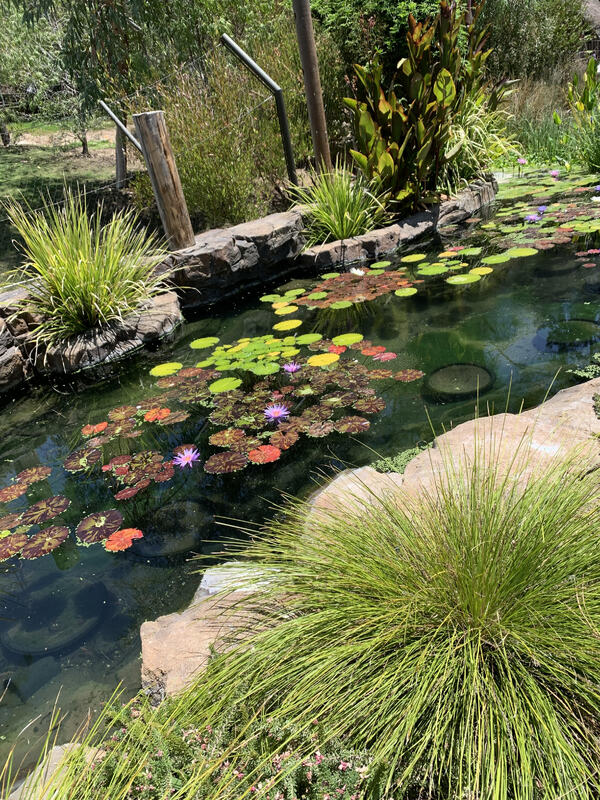 2021-07-27
2021-07-27San Diego Zoo Safari Park
Looking back at my camera roll, I chose this picture as the subject of this assignment. The picture reminded me of the first trip that I took, a year after COVID happened. The summer of 2021, my family and I were able to take a trip to San Diego, California and we decided to go to the San Diego Zoo Safari Park. I am a lover of nature and I enjoy the scenery and being able to appreciate the simple beauty of plants and animals. As any other normal traveler would do, I snapped a bunch of pictures as I was walking through the safari park zoo. I snapped this picture as I was on the tram and we were observing the large animals (rhinoceros, giraffes, etc.). This particular picture spoke to me, becuase I saw it as the first time I could actually enjoy the simplicity of having the means to travel and enjoy the beauty of the outside world, after being cooped up for so long. Since I live in the Phoenix area, it is not often that I get to see lily ponds or vibrant plants/animals in my area. I remember feeling free and appreciative of having the means to travel and see the outside world again. -
2022-05-20
The time I travelled to Punta Cana
When the restrictions were lifted, I took a trip to Punta Cana in the Dominican Republic right after finishing my internship and getting ready to graduate. Originally, I was supposed to go in November with my family, but we couldn't because my parents and sister got COVID. Unfortunately, we had to reschedule the entire trip. During that time, I had to isolate in my room, wear a mask inside the house, and wash my hands frequently. This time, it was just us traveling. When we were getting ready to board the plane, we needed our vaccine cards. My dad got a bit worried, thinking I might have forgotten mine, and had a mild panic attack. In the area, many people weren't wearing masks since the requirements had been lifted and they were no longer mandatory. However, I still noticed quite a few people wearing masks, even boarding the flight. Our rooms were spacious; my parents had their own room, and my sisters and I had ours. We stayed at an all-inclusive resort, where drinks, food, and activities were available all day long. One memorable part of the trip was going on a boat excursion where we got to snorkel with other travelers and see various fish below us. It felt like COVID was a thing of the past, but there were still reminders like stickers and signs in both English and Spanish reminding us to stay six feet apart. Overall, it was a fun trip that helped take my mind off the stress of the pandemic, although there were still reminders here and there. -
2020-12-30
Travelling in December 2020 and January 2021
I remember first hearing about COVID-19 in January of 2020. There were concerning reports that Chinese authorities were wielding apartment doors shut to contain the virus, which was certainly a bad sign, and I was fairly certain that if those measures were being taken, the disease was a big deal. I followed the developments fairly closely from my parents' home in Oklahoma. In late March, around the time of my 21st birthday, I was working as a substitute teacher at the high school I graduated from. I was able to work one singular day before the virus shut down the school district. The next few months were full of changes. Uniformed National Guard personnel staffed vaccination centers, groceries were delivered directly to houses, and entire industries went work-from-home. By the time December rolled around, the initial panic had mostly died down, and many travel restrictions were lifted. I needed a break. I decided to catch a ride with a buddy of mine from Indiana who just so happened to have family here in Tulsa. I bought a plane ticket to facilitate my return trip. We have some mutual friends in Zionsville, a little suburb of Indianapolis, and we collectively decided that we wanted to have a New Years party. Here in suburban Oklahoma, many of the mask mandates had been dropped by this point, but it was still prudent to carry a mask in the somewhat rare event that a business owner preferred patrons cover their faces. It was much the same in Zionsville, but businesses in Indianapolis proper, in my experience, were much more strict. I understood that COVID-19 was a serious health risk, and that it was smart to wear a mask, but it was somewhat confusing to go from a place that seemed so carefree - and admittedly irresponsible - to a place that was still mandating face coverings. The party with my friends went well and many margaritas were consumed. It was a much-needed break. The locations with the strongest COVID restrictions were perhaps the airports. It made sense to me, since airline travel likely contributed a great deal to the initial spread of the disease. Regardless of reasonability, masks were worn the entire duration of the flight. The entire cabin smelled of sanitation wipes, and the airport felt somewhat emptier than I was used to. This was Indianapolis' airport. I had a layover in Dallas and that Airport felt much more lively, in that sort of carefree way I was accustomed to back in Oklahoma. Masks were still required on the plane itself. I landed back home late in the evening without too much excitement. It was nice to take my mask off when I got into my mom's car. Overall, the trip made me realize that different states and regions were treating the ongoing pandemic very differently. While New Years was a welcome break from the monotony of the initial quarantine year, the trip did raise questions about my state government's commitment to public health and safety. -
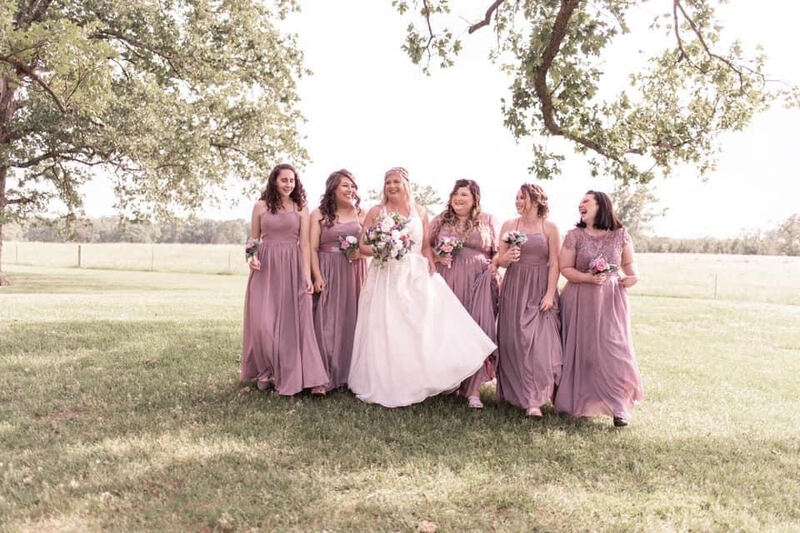 2021-06-07
2021-06-07A Pandemic Wedding
My friend had been planning her wedding for nearly two years when the pandemic hit, and suddenly, she had to put all of her plans on hold. It was a devastating moment for her and everyone who was looking forward to the special day. When travel restrictions were lifted, her bridal party (including me) rushed to get plane tickets to ensure our presence by her side in small town, Texas. We wanted everything to go perfectly for her considering the delay she endured and the preparations that were now unclear. It was an outside wedding filled with beautiful twinkling lights, neatly placed wooden benches, and masks, sporadically, spread throughout the crowd. A year after the lockdowns and restrictions, Covid 19 still affected people enough to don masks outside during a wedding. Despite the residual fear, my memories of spending time with friends, eating good food, and cheering on the beautiful bride are happy ones. -
2021-03-18
A Burial Post Pandemic
I did not travel during the entirety of the strict lockdown period of the COVID-19 Pandemic. My wife and I worked in retail and were deemed essential so we worked through it from April 2020 until the restrictions were broadly lifted. In March 2021 my mother died of an unrelated illness, the first trip I took after the travel restrictions were lifted was to bury her in Carlsbad, New Mexico. We did not hold a funeral service and we did not hold a memorial, she was cremated and buried quietly. I remember this very vividly because even at that time it felt wrong to travel and to be interacting with people in a way that wasn't required by work. We wore masks the entire time. Due to our proximity to El Paso, TX I remember vividly when they were storing bodies in buses in the streets there and this made us fearful and cautious. Even had we not been still in the throes of the pandemic, I don't think I would have done anything differently but I do believe that the added stress of travel would not have been present thus making the trip more manageable. Due to our need to isolate, and resist getting sick, what I remember most of all is the loneliness of the matter, and the quiet car rides, and wondering 'How might things have been different?' -
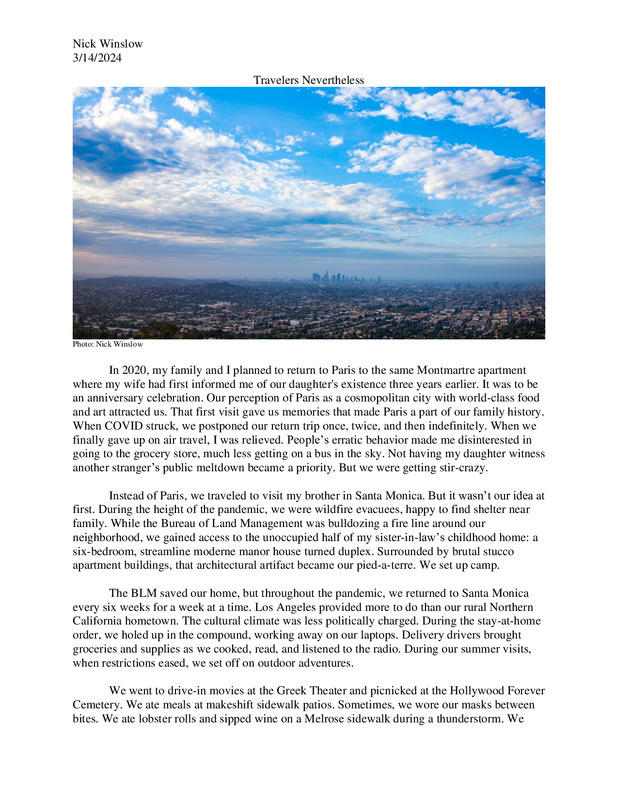 2020-03-22
2020-03-22Travelers Nevertheless
Faced with the impossibility of international travel during the COVID-19 pandemic, my family embarked on an unplanned intrastate adventure that led to a deeper appreciation for the city of Los Angeles and for family members that call that city home. Along with posing serious day-to-day challenges, the pandemic created opportunities for new relationships with people and places. -
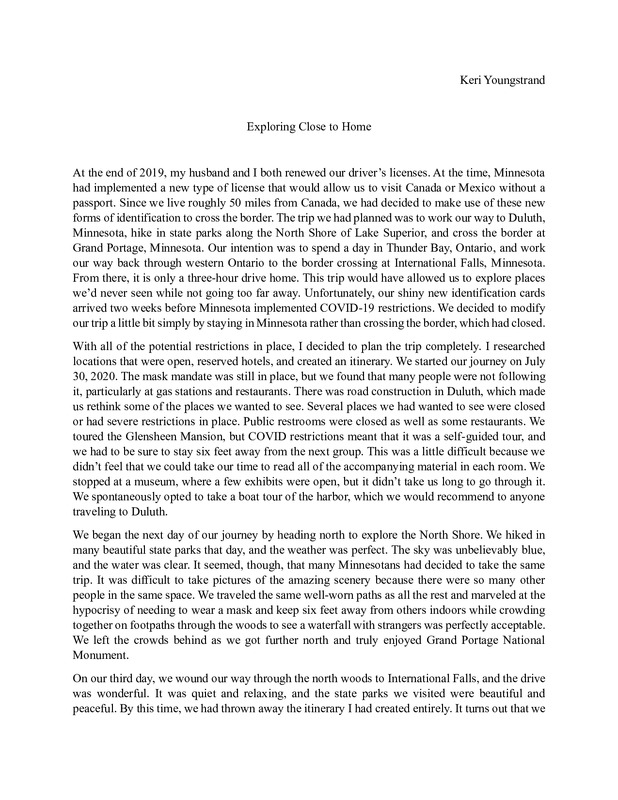 2020-07-30
2020-07-30Exploring Close to Home
This story describes the first trip that my husband and I took during the pandemic. It was at the July 30 - August 1, 2020, and we took our first trip without children in twenty years. The pandemic shaped this trip completely. First, we could not cross the border we had wanted to cross, which meant we stayed in our home state. Second, we researched destinations in ways that we never had before. Finally, the pandemic had forced many other people to seek outdoor vacations, which led to large crowds in many of the parks we visited. -
2024-12-10
Visiting Maui with Respect to Native Traditions and Local Population
Since travel restrictions were lifted on the island of Oʻahu, I still have not traveled outside the island. One place that I am keen on traveling to is the island of Maui because it is one of the main Hawaiian Islands that I have not yet explored. Prior to the devastating Lahaina wild fires in August 2023, I was deeply interested in understanding the cultural richness and historical significance of Lahaina. Now, if I get a chance to visit Maui, I would be mindful of the trauma that continues to inflict pain on the local and native populations of Maui. Therefore, I would avoid the area of West Maui and instead explore the main cities of Kahului and Kihei to better understand why Maui continues to be a tourist attraction for Americans. Near Kihei, the site of Haleakala observatory is a common tourist attraction for locals and foreigners. The ongoing debate over tourism development and the restoration of native practices is ever-present on Maui. Tourism on Maui was just recovering from the economic consequences of the pandemic and the economic hardship was again devastated by the Maui wildfires. If I were to document my trip to Maui, I would use a journal to understand the complex dynamics between the state government, tourism industry, and local and native populations. I would also use my journal to record what tourist sites continue to recover from the pandemic in spite of the wildfire catastrophe. -
2021-03-11
Missouri Travels A Year After COVID
In 2020, the COVID-19 pandemic shut everything down, and the world went into a global lock down. A year later, restrictions started being lifted and my mother and I traveled to Osage Beach Missouri, as well as the surrounding areas. Because Osage Beach was a tourist town on a lake most of the local attractions were closed due to it being the off season. It was March of 2021. Previously, my family had loved going to Missouri, but always had gone to Branson. We chose Osage Beach, however, because we could get free accommodations through my parents timeshare points. The day I remember most of the trip was traveling to St. Louis, Missouri to visit the St. Louis Zoo. The day before going we had to book a time slot in order to reduce our chances of being exposed to COVID and in order for the zoo to know approximately how many people were there. We did not have to wear medical masks outdoors, since we were fully vaccinated, but when in areas like the gift shop or some dining facilities we had to wear masks. If a zoo worker asked to see our COVID vaccine cards we had to show them or put on masks. After visiting the zoo, my mom and I went to a local pizza pub in Osage Beach that had St. Louis style pizzas. They were not as concerned about the COVID regulations and did not enforce any mask or social distancing policies that the St. Louis Zoo had. This was a theme of Missouri restrictions as I saw when I toured the Missouri State Penitentiary in Jefferson City. There I was not required to wear a mask or social distance, but group numbers were limited and reservations had to be made. Luckily my mother and I did not get COVID during the trip, but after a year of lock down and restrictions, the few restrictions still in place felt like a culture shock, even though I still lived in Texas at the time. -
2022-06-25
Exploring Cairo
I visited Cairo in the summer of 2022. I decided to upload a picture of myself overlooking the city of Cairo. It was my first time visiting a Muslim country and a non-Western country. This was the main reason why I wanted to go. I chose to upload this picture because it reminds me of the awing experience of taking in Cairo for the first time. There were still a few Covid-19 restrictions in place at the time, but the Egyptian authorities didn't seem too interested in actually enforcing them at the airport or anywhere else. I took this photo on Anthony Bourdain Day (June 25th). Anthony Bourdain and his show are one of my major inspirations to travel and experience the wider world. -
 2021-10-21
2021-10-21Phoebe Bridgers at the Greek Theatre
I was able to get tickets to see Phoebe Bridgers in LA October of 2021. My best friend and I drove out there from Arizona. It was an amazing show at the Greek Theatre, which is a beautiful venue located in Griffith Park. This was the first time I travelled to see a concert, and since it has become something that I do often. I've even been back to the Greek Theatre three times since and already have tickets to a show there later this year. During this time, there was still a lot of Covid-19 restrictions in place. Even though it was an outdoor concert venue everyone still wore their masks the whole show and we had to show our vaccination cards upon entry. -
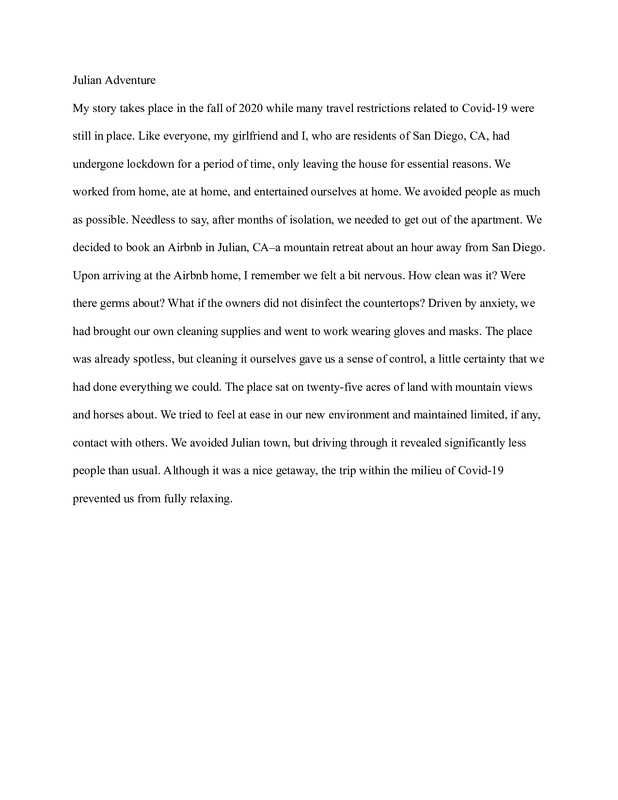 2020-10-22
2020-10-22Julian Adventure
Julian Adventure My story takes place in the fall of 2020 while many travel restrictions related to Covid-19 were still in place. Like everyone, my girlfriend and I, who are residents of San Diego, CA, had undergone lockdown for a period of time, only leaving the house for essential reasons. We worked from home, ate at home, and entertained ourselves at home. We avoided people as much as possible. Needless to say, after months of isolation, we needed to get out of the apartment. We decided to book an Airbnb in Julian, CA–a mountain retreat about an hour away from San Diego. Upon arriving at the Airbnb home, I remember we felt a bit nervous. How clean was it? Were there germs about? What if the owners did not disinfect the countertops? Driven by anxiety, we had brought our own cleaning supplies and went to work wearing gloves and masks. The place was already spotless, but cleaning it ourselves gave us a sense of control, a little certainty that we had done everything we could. The place sat on twenty-five acres of land with mountain views and horses about. We tried to feel at ease in our new environment and maintained limited, if any, contact with others. We avoided Julian town, but driving through it revealed significantly less people than usual. Although it was a nice getaway, the trip within the milieu of Covid-19 prevented us from fully relaxing. -
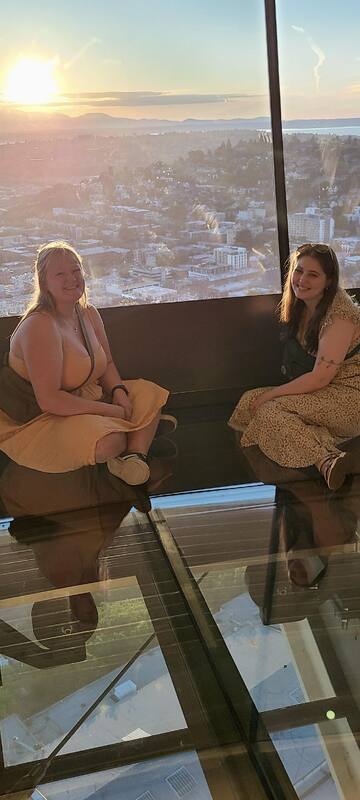 2023-07-13
2023-07-13Post-Pandemic Trip to Seattle
Like it did for many people, the start of the Covid-19 pandemic canceled multiple travel plans for me. I applied for my passport in 2018 with the intention of going on a study-abroad trip my junior year of undergrad. Instead of travel memories, I have a memory of sitting in my PoliSci class and discussing the news with my classmates that the university might shut down for a few days. We didn’t go back, and I still haven’t used the passport. Once travel restrictions were lifted it still took me a while to get back out into the world. The first trip I took was in July of 2023. I traveled from Minnesota to Seattle, Washington with some of my friends from high school for a week of sightseeing. We chose it because most of us had never been to the Pacific Northwest. It was my first time in an airport since December of 2018. I remember having quite a few lingering anxieties related to Covid, to the point where I was actually dreading the trip before we left (even though I ended up having a wonderful time). I had some struggles with health anxiety during the pandemic. Before tests were widely available I remember frequently being so paranoid I had Covid that I would convince myself I did and actually make myself feel sick with anxiety. Since restrictions have been lifted this has stuck around, and now takes the form of me getting excessively anxious about getting Covid before important events (like the trip, and my wedding just a few weeks before it). I also was nervous about going to the airport because I didn’t know what to expect in regards to how many restrictions would still be in place. It turned out there were no restrictions remaining in the MSP or SeaTac airports beyond some signs reminding people to not enter if they felt unwell (I am certain most people who make it far enough to see the sign still enter). Once the actual boarding of the plane went fine, I entertained myself with anxieties about the odds of someone on the plane having Covid and all of us breathing circulated air. I actually had Covid once in the fall before the trip, and got the highest fever of my life but was ultimately okay. Interestingly, this didn’t really ease my fears during the flight. Nobody got Covid from the Seattle trip (though we were probably just lucky) and instead I got some of the most precious memories of my life so far. I also had a surprising lack of anxiety once we got there. We visited a long list of places including most notably the Space Needle, Chihuly Garden and Glass Museum, Seattle Aquarium, Pike Place Market, and the National Nordic Museum. There were no Covid-19 restrictions remaining in any of these places. I had packed one reusable mask in my backpack in case I needed it, and it turned out the one time on the whole trip that I entered a space where masks were required (a small independent bookstore) I didn’t have it with me and had to borrow one. I still thought about Covid every time we pushed through a packed crowd in Pike Place Market, but more so than being afraid I thought about how during the peak of the pandemic I was convinced it was something I would never do again. I don't believe the pandemic is truly over even now, but I drastically felt how much things had changed in that moment. The picture I included to tell my story is of my friend Carlie and I on the top of the Space Needle (I am sitting on the right). We went back twice, and spent literally hours sitting on the glass floor and watching the city go by as it slowly rotated. It's one of my fondest memories of the trip. I’ve heard some people say the Space Needle is overrated, but as small-town Midwesterners we were pretty fascinated. I’m grateful to those who spent the pandemic under harsher restrictions in bigger cities like Seattle so that I can visit these places now. It was nice to feel so small looking down on Seattle after the world felt so small during restrictions just a few years earlier. -
2021-10-11
Disney Wedding 2021
My wife and I were supposed to go to her best friend's wedding in the fall of 2020. Well, with millions of other weddings and events that year, it had to be postponed. The wedding ended up taking place at Disney world in the fall of 2021. We flew from New York to Orlando, and I remember that everyone was still wearing masks in the airports and on the planes. And if I remember correctly masks were required on the plane for the whole ride. While staying on Disney property and in the parks, masks were required inside buildings. But outside you could have them off. During the wedding, which was on Disney property, we did have to wear masks for the ceremony, and while dancing, but at the tables, we could take them off. Still, it was a magical time, and the VIP access to the Epcot fireworks is still my favorite memory. Even now, in 2024, I will still wear a mask if I go on a plane again, or public transportation. That is something from the pandemic I think will definitely stick with me for the rest of my life. -
2020-09-07
Pandemics & Wildfires
The year 2020 was challenging for me in a couple ways. Like so many others, the pandemic lockdown kept me home for several months. I continued school online with my local university and waited for it all to be over. As summer rolled around, my family had decided that if we were going to be isolated from others, we might as well do it somewhere we love. We spent the better part of our summer at my great grandfather’s cabin at Huntington Lake in the High Sierras. It was a fairly quiet season at the lake considering California was still under many restrictions. Shortly after our last visit, the Creek Fire started. The fire burned nearly 380,000 acres of the Sierra National Forest for about four months. Within a week of the beginning of the fire, we lost our family cabin and the historic general store, Cressman’s, that our cousins had just taken over. Our family was devastated, and it is still a very painful memory. I am, however, incredibly grateful for the last summer we got to spend there. In a strange way, the COVID-19 pandemic offered our family a small blessing in disguise. Since the lockdown required many to reduce work hours, a number of friends and family members had the opportunity to visit the cabin one last time. This photograph is a reminder of a very bittersweet summer. Although 2020 proved to be an especially challenging year, the pandemic allowed my family to make its final memories of our second home before it was gone. -
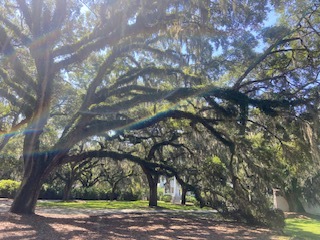 2023-07
2023-07Boston & Italy During Covid; Civil Rights Trip 2023
Prior to the world-stopping "Covid Times," my friends and I had planned to travel to Boston, MA. We were going to watch a Braves v. Red Sox game, visit Salem and the Freedom Trail in Boston. We had tickets, airfare, lodging etc. Then the world shut down. Because of life circumstances, we had to delay further after the world opened back up, and decided to shift gears and take a different trip. This would be a Civil Rights trip in the Summer of 2023. Again, life circumstances created the need to adjust. Two members of our group (half of us) were no longer able to travel, so myself and the other member of our group went. The trip was great. We flew into NC, then drove to Charleston where we spent a couple days. It was great because we were able to visit several places which were very impactful to both of us. McLeod Plantation was a wonderful & educational experience. We were given a fantastic guided tour where we learned much about the enslaved people who made the plantation function, and then about their descendants, some of whom lived there until the 1990's. We also visited the Old Slave Mart which was one of the most prominent sites in Charleston for slave sales. It has now been turned into a museum and memorial. From Charleston, we visited Savannah. We were only there about 12 hours, but were able to visit the house of a very prominent slave trader and see the living and working quarters of the people enslaved there. From there, we went to Atlanta (I got to watch a game at Truist Park!) for the night, and then on to Montgomery. If we could do it again, I would spend much more time in Montgomery. We visited the Legacy Museum which was, in a phrase, life changing. The experience was phenomenal and extremely visceral. I think it is something every American should experience at least once. We spent the whole day, and barely scratched the surface. And that was just the museum and monument. From Montgomery we drove to Selma and were able to walk the Edmund Pettus Bridge. We also drove around town a little and were able to see some of the churches, and neighborhood that were so influential in the Civil Rights Movement and the powerful Selma to Montgomery March. From there, we went to Memphis where we visited the National Civil Rights Museum. That was also a wonderful experience. This was such an awe-inspiring trip. It was very quick, but it was fantastic. It is a trip that I would take again though next time for longer.
